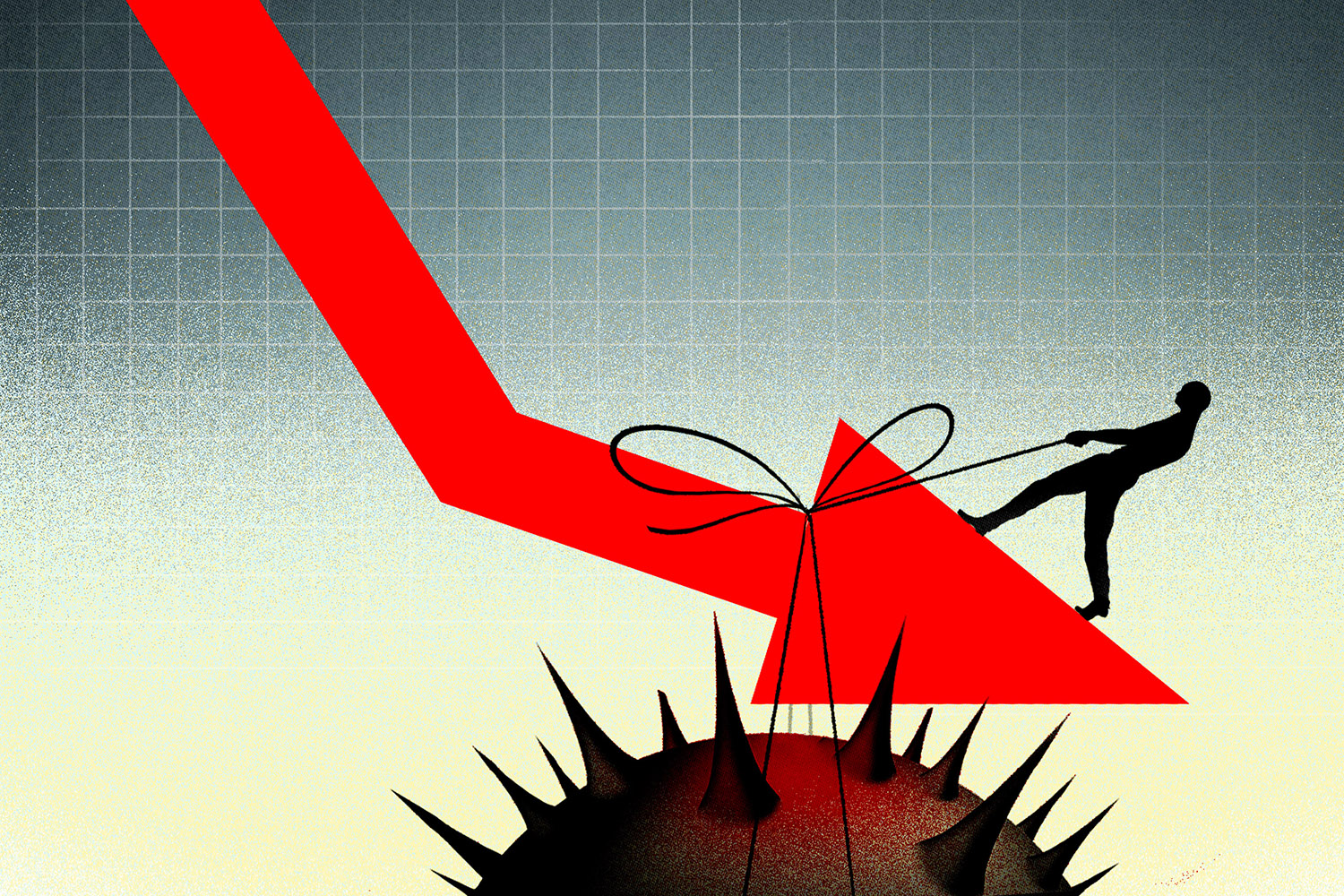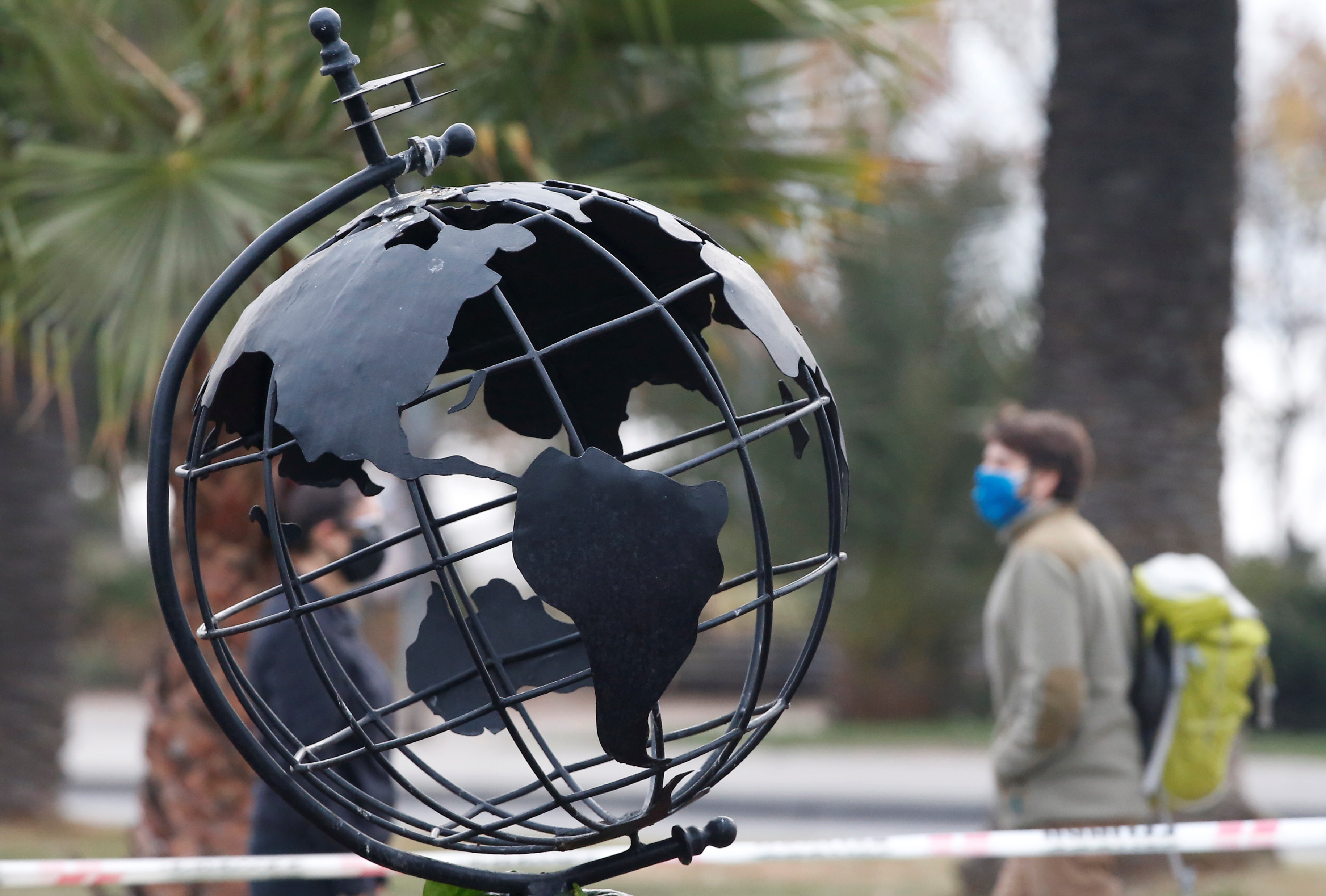More On: recessions
What Americans Don’t Know about Inflation
Not Just Recession
There are two types of recessions, and the United States is likely to see one that is nothing like the one that occurred in 2008
Why the world economy might change forever.
It would be a huge understatement to say that the last few years have been hard on the economy. Inflation is at its highest level in decades, and a combination of geopolitical tensions, disruptions in the supply chain, and rising interest rates threatens to send the global economy into a recession. Yet, economists and financial analysts have, for the most part, seen these changes as part of the normal business cycle. From the U.S. Federal Reserve's initial mistaken prediction that inflation would be "transitory" to the current consensus that a likely U.S. recession will be "short and shallow," there has been a strong tendency to see economic problems as temporary and easy to fix.
But instead of another turn of the economic wheel, the world may be going through big structural and long-term changes that will last longer than the current business cycle. Three new trends, in particular, point to this kind of change and are likely to have a big impact on how the economy does in the next few years: the shift from insufficient demand to insufficient supply as a major multi-year drag on growth, the end of central banks' ability to print as much money as they want, and the growing fragility of financial markets.
These changes help explain a lot of the strange things that have happened in the economy over the last few years, and they are likely to cause even more uncertainty in the future as shocks become more common and stronger. People, businesses, and governments will all be affected by these changes in economic, social, and political ways. And until analysts realize that these trends are likely to last longer than the next business cycle, the economic problems they cause are likely to be much bigger than the opportunities they bring.

DOWN IS UP
Recessions and bouts of inflation happen from time to time, but in the last few years, there have been a number of global economic and financial events that were very unlikely, if not unthinkable. Once a supporter of free trade, the United States is now the most protectionist advanced economy. The UK suddenly became like a struggling developing country after a bad mini-budget weakened the currency, sent bond yields skyrocketing, caused ratings agencies to put the UK on "negative watch," and caused Prime Minister Liz Truss to resign. When interest rates on more than a third of global bonds went negative, borrowing costs went up sharply (creating an abnormal situation in which creditors pay debtors). The war between Russia and Ukraine paralyzed the G-20 and sped up what had been a gradual weakening of the group. Some Western countries have also turned the international payments system, which is the backbone of the world economy, into a weapon in an attempt to punish Moscow.
Add to this list the rapid centralization of China under Xi Jinping and its separation from the United States, the strengthening of autocracies around the world, and the polarization and even breakup of many liberal democracies. Climate change, changes in population, and the slow shift of economic power from the west to the east were more predictable, but they have still made the global economy more complicated.
Many analysts have tended to try to find a unique explanation for each surprising event. But there are important things that all of the economic and financial events have in common. These include the failure to create rapid, inclusive, and sustainable growth, the overreliance of policymakers on a small set of tools that has caused more problems than it has solved over time, and the lack of action to solve global problems that affect everyone. These things have a lot in common, and most (but not all) of them come down to three big changes in the global economy and finance.
WORLD REWIRED
As the world came out of the global financial crisis of 2007–2008, most economists said that slow economic growth was due to a lack of demand. The U.S. government tried to fix this problem through stimulus spending (even though Congress was too divided to do this from 2011 to 2017) and, more importantly, by setting a floor for interest rates and flooding the markets with a lot of cash. First, the Trump administration's spending cuts and tax cuts gave the strategy a boost. Then, both the Trump and Biden administrations helped households and businesses in need during the COVID-19 pandemic, while the Federal Reserve poured money into the system.
But many people didn't know that the world economy was going through a major structural change that made supply, not demand, the real problem. At first, COVID-19 was what made this change happen. It is not easy to get the global economy going again after it has been forced to stop. Both the ships and the shipping containers are in the wrong place. Not every piece of production comes back online at the same time. There are problems in supply chains. And thanks to huge government handouts and a lot of money from the central bank, demand is rising much faster than supply.
Already-challenged growth models are coming under even greater stress.
As time went on, though, it became clear that the shortages weren't just caused by the pandemic. Some groups of people left the workforce at unusually high rates, either because they wanted to or because they had to. This made it harder for companies to find workers. This problem got even worse when global labor flows got messed up because fewer foreign workers got visas or were willing to move. Faced with these and other limits, companies started to put more emphasis on making their operations more resilient, not just more efficient. In the meantime, governments made trade, investment, and payment sanctions more like weapons. This was in response to Russia's invasion of Ukraine and the growing tensions between the US and China. These changes sped up the process of rewiring the world's supply chains after the pandemic so that there would be more "friend shoring" and "near shoring."
This isn't the only wiring job going on. Climate change is finally making businesses, families, and governments change how they do things. Given how dangerous the world is, we have no choice but to stop doing things that hurt it. It's clear that the way things are going now can't last, and it's also clear that a green economy would be better. But the change will be hard because countries and companies' interests aren't yet aligned enough on this issue and there hasn't been enough international cooperation to make it work.
In the end, changes in the way globalization works, widespread labor shortages, and the need to deal with climate change have made supply problems worse and put even more stress on growth models that were already having trouble.

SCRAMBLING CENTRAL BANKS
Even worse, these changes in the global economy are happening at the same time that central banks are making big changes to the way they do things. For years, the central banks of the world's biggest economies have thrown more money at any sign of a weak economy or a volatile stock market. Even though they didn't want to, they had to use their tools, which were admittedly not perfect, to keep the economy stable until the governments could stop being so divided and do their jobs.
But the longer central banks kept doing what was supposed to be a short-term fix—buying bonds for cash and keeping interest rates artificially low—the more damage they did to other things. The real economy didn't benefit much from these policies because the financial markets became more liquid and separated from it. The rich, who own the vast majority of assets, got richer, and the markets started to think of central banks as their best friends who were always there to keep the markets from being too volatile. Eventually, the markets started to react badly to even hints of less support from the central bank. This held the central banks hostage and stopped them from making sure the economy as a whole was healthy.
All of this changed when prices went up quickly in the first half of 2021. At first, the Fed mistook the problem for a temporary one and made the mistake of letting price increases in energy and food grow into a widespread cost-of-living problem. Even though there was more and more evidence that inflation wouldn't go away on its own, the Fed kept adding money to the economy until March 2022, when it finally started to raise interest rates, albeit slowly at first.
But by that time, inflation had gone above 7%, and the Fed was in a tough spot. Because of this, it had to switch to a series of much steeper rate hikes, including a record-setting four consecutive 0.75 percentage point hikes from June to November. The markets saw that the Fed was trying to make up for lost time and started to worry that it would keep interest rates high for longer than is good for the economy. The result was volatility in the financial markets, which, if it kept up, could threaten the way global financial markets work and hurt the economy even more.
RISKY BUSINESS
Another bad effect of getting markets to always expect easy money was that it caused a lot of global financial activity to move from highly regulated banks to less well-known and regulated entities like asset managers, private equity funds, and hedge funds. These groups did what they were paid to do, which was to use the current financial situation to make money. That meant taking on more debt and leverage, going outside of their areas of expertise, and taking on more risks. They did this because they thought that easy money and reliable support from the central bank would last for a long time.
Few of these businesses had planned for sudden changes in how much it costs to borrow money or how easy it is to get money. The United Kingdom almost went bankrupt in October 2022, which was a very bad example of the kind of shock that followed. After Truss announced a plan for big tax cuts that wouldn't be paid for, the yields on government bonds went up, which surprised some pension funds with a lot of debt. Without the Bank of England's quick action, the Truss government's U-turn, and the eventual removal of the prime minister, the bond selloff could have led to a major financial crisis and an even worse recession.
The instability of the financial system also makes it hard for central banks to do their jobs. Instead of their usual problem, which is how to lower inflation without hurting growth and jobs, the Fed now has a trilemma: how to lower inflation, keep growth and jobs safe, and keep the economy stable. With inflation being so high, there is no easy way to do all three.

BUMPY ROAD, BETTER DESTINATION
These big structural changes explain a lot about why growth is slowing in most of the world, why inflation is still high, why financial markets are unstable, and why a rising dollar and interest rates are giving so many countries trouble. Unfortunately, these changes also make it harder to predict with a lot of certainty what will happen with the world's economy and finances. Companies and governments no longer plan for a single likely outcome, called a baseline. Instead, they have to plan for many possible outcomes. Some of these outcomes are likely to cause more bad things to happen, so one bad thing is likely to be followed by another. In such a world, it's hard to make good decisions and easy to make mistakes.
Lucky for us, it's not a secret how to get around in this kind of world. It's important to be strong, flexible, and quick. Resilience, or the ability to get back on your feet after a setback, often depends on a strong balance sheet, as well as stamina, endurance, and honesty. Optionality, which lets you change your mind with little effort, is based on the open-mindedness that comes from having people of different genders, races, cultures, or experiences. And agility, or the ability to respond quickly to changing circumstances, depends on leadership and government that let people make bold moves when things are clearer.
Companies and families won't be able to avoid all the economic and financial bumps ahead even if they are resilient, have options, and are flexible. But it will make it much easier for them to deal with those bumps and more likely that they will end up at a better place, one that is more inclusive, friendly to the environment, and collaborative and much less reliant on a skewed and unstable financial system.
The goal for national governments and central banks should be to make sure there aren't too many problems along the way and to increase the chances that everyone will end up in a better place. Modernizing infrastructure to help increase supply, improving training and retooling programs for workers, and starting public-private partnerships to meet urgent needs, like making vaccines, should be policy priorities. At the same time, governments and central banks should keep fighting inflation and get better at coordinating fiscal policy, monetary policy, and structural reforms that boost growth and productivity.
Economic and financial outcomes are becoming harder to predict.
Governments should also do a better job of keeping an eye on and regulating non-bank financial entities. To do this, they will need to learn a lot more about the technical connections between them, the implicit leverage that lurks off their balance sheets, and the ways that risk can spread to the rest of the financial system. Lastly, governments should set up stronger safety nets to protect the weakest parts of society, which have been hit the hardest by economic and financial shocks in the past.
These kinds of efforts will have to be made on a global scale. Governments will need to work together to reform international financial institutions, pool insurance against common shocks, improve early warning systems, restructure the debts of countries struggling under heavy debt overhangs that starve their social sectors and stop capacity building, and make the G-20 work better.
This is a big job, but it can be done. The longer households, businesses, and governments don't notice and respond to structural changes in the global economic and financial system, the harder it will be to reduce the risks and take advantage of the opportunities these changes bring. The world isn't just on the verge of another economic downturn. It is in the middle of a big change in its economy and finances. If the world wants to get to a better place, it needs to be aware of this change and learn how to deal with it.













